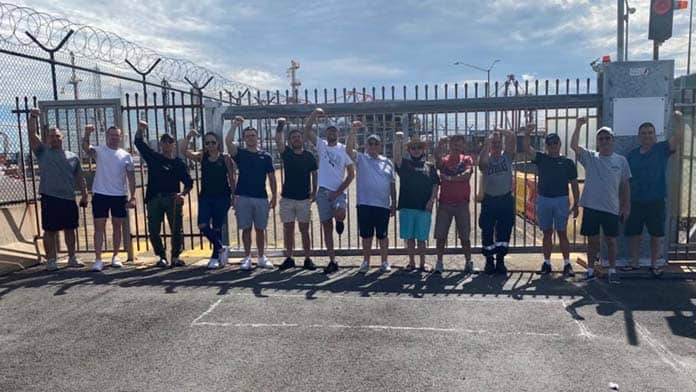In a decisive victory, Ausport lines workers (who tie up vessels in port) have forced a non-union operator in Port Botany to shut up shop in just nine days.
Militant pickets by the Maritime Union of Australia (MUA) workforce were key.
MUA Sydney branch secretary at the time, Paul McAleer, called it: “One of the biggest disputes in Australia this year… They were going to destroy an entire sector of our industry. The importance of the victory can’t be underestimated.”
There were previously two lines companies in operation in Port Botany. Ausport competitor National Maritime Services announced in February 2020 they were dissolving the company and sacked their entire union workforce.
Paul Keating, then deputy Sydney branch secretary of the MUA, said the company notified the union only on the same day they closed their doors.
NMS blamed the economic fallout of the COVID-19 pandemic and said the workers’ log of claims was unaffordable.
But this was a cover-up. Just six months later they launched a new company called Port and Harbour Services and brought in scab labour on a non-union agreement, mostly as casuals.
Ausport workers are on good, secure conditions, with a two-weeks-on, two-weeks-off roster.
There is no way they could compete long-term with casual rates or permanents with only four weeks’ annual leave per year.
The only way to save their own jobs and conditions was a determined fight to prevent PHS getting a foothold at all.
Ausport MUA member Alana Elliot told Solidarity, “If they got away with it we’d be sunk for sure. We knew we had to put everything on the line—our livelihood was at stake.”
The Ausport crew fought back immediately.
For nine days they chased down and picketed every arriving and departing PHS vessel they could, in between doing their own shifts.
They delayed ships, holding one up for four hours. And they didn’t limit themselves to on-land activities—they went out in vessels to hassle and film the PHS boats and even hired jet-skis on one occasion.
They tracked down the secret location of a rec-room set up for the scab workforce and rallied there.
Police were brought in to escort scab labour in vans with tinted windows, with the scabs going through the gate with covered faces.
The Ausport workers posted videos of themselves attempting to block the buses, shaming and yelling at the scab workforce inside and accusing the police of being “scab protectors”—the video got 63,000 views.
Despite some pressure to remove the videos, they didn’t budge, proud of their defiant approach.
Defiance
They were hit with $5000 in fines from the police over the course of the dispute—which they made their own boss pay!
“We didn’t care if we got arrested or fined,” Alana explained. “You have got to send a message that you aren’t messing around. I learned so much about passion and sticking to your cause.”
On the ninth day, 20 Ausport members went to occupy the foyer of Caltex, the site employing most of the work by the scab operator. This was during the height of the COVID pandemic and police were counting their numbers ready to make fines and arrests if they exceeded the 20-person limit.
They made a racket and demanded someone come downstairs to speak to them. No one did.
It was just after they left Caltex that the MUA organiser received a call saying PHS had closed its doors. “The best call a unionist could get,” according to one delegate.
This fighting spirit attracted support from other MUA workers, as well as members of other unions—CFMEU (construction), Firefighters, Rail Tram and Bus Union and the United Workers Union—who attended community pickets throughout the dispute.
In an industrial environment where it is becoming all too common to turn to the Fair Work Commission and the courts to resolve disputes, the fighting approach led by MUA delegates at Ausport is a breath of fresh air and an example to be followed.
The victory laid the basis for Ausport to negotiate their new EBA, which included a 20 per cent pay rise over five years.
Invigorated by their own fight, Ausport workers joined the picket of locked-out UWU Coles workers in the months that followed. As the economic recession drags on, this is the kind of struggle and solidarity we are going to need.
By Erima Dall






